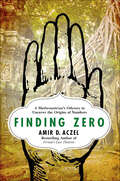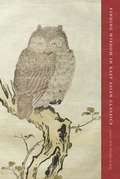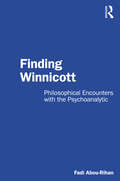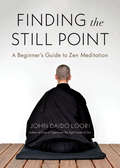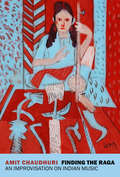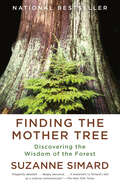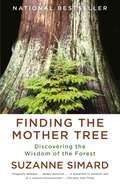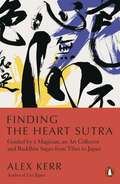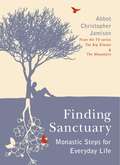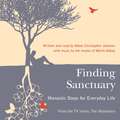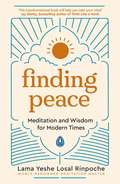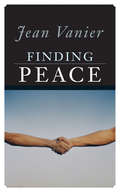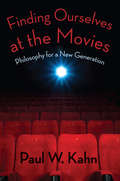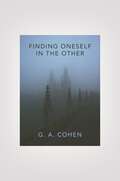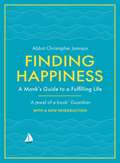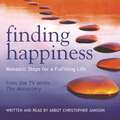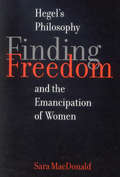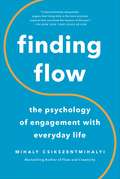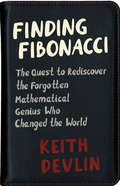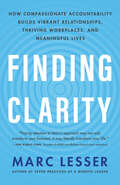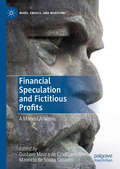- Table View
- List View
Finding Zero: A Mathematician's Odyssey to Uncover the Origins of Numbers
by Amir D. AczelThe invention of numerals is perhaps the greatest abstraction the human mind has ever created. Virtually everything in our lives is digital, numerical, or quantified. The story of how and where we got these numerals, which we so depend on, has for thousands of years been shrouded in mystery. Finding Zero is an adventure filled saga of Amir Aczel's lifelong obsession: to find the original sources of our numerals. Aczel has doggedly crisscrossed the ancient world, scouring dusty, moldy texts, cross examining so-called scholars who offered wildly differing sets of facts, and ultimately penetrating deep into a Cambodian jungle to find a definitive proof. Here, he takes the reader along for the ride. The history begins with the early Babylonian cuneiform numbers, followed by the later Greek and Roman letter numerals. Then Aczel asks the key question: where do the numbers we use today, the so-called Hindu-Arabic numerals, come from? It is this search that leads him to explore uncharted territory, to go on a grand quest into India, Thailand, Laos, Vietnam, and ultimately into the wilds of Cambodia. There he is blown away to find the earliest zero—the keystone of our entire system of numbers—on a crumbling, vine-covered wall of a seventh-century temple adorned with eaten-away erotic sculptures. While on this odyssey, Aczel meets a host of fascinating characters: academics in search of truth, jungle trekkers looking for adventure, surprisingly honest politicians, shameless smugglers, and treacherous archaeological thieves—who finally reveal where our numbers come from.
Finding Wisdom in East Asian Classics
by De Bary Wm. Theodore Ed.Finding Wisdom in East Asian Classics is an essential, all-access guide to the core texts of East Asian civilization and culture. Essays address frequently read, foundational texts in Chinese, Japanese, Korean, and Vietnamese, as well as early modern fictional classics and nonfiction works of the seventeenth century. Building strong links between these writings and the critical traditions of Confucianism, Buddhism, and Daoism, this volume shows the vital role of the classics in the shaping of Asian history and in the development of the humanities at large.Wm. Theodore de Bary focuses on texts that have survived for centuries, if not millennia, through avid questioning and contestation. Recognized as perennial reflections on life and society, these works represent diverse historical periods and cultures and include the Analects of Confucius, Mencius, Laozi, Xunxi, the Lotus Sutra, Tang poetry, the Pillow Book, The Tale of Genji, and the writings of Chikamatsu and Kaibara Ekken. Contributors explain the core and most commonly understood aspects of these works and how they operate within their traditions. They trace their reach and reinvention throughout history and their ongoing relevance in modern life. With fresh interpretations of familiar readings, these essays inspire renewed appreciation and examination. In the case of some classics open to multiple interpretations, de Bary chooses two complementary essays from different contributors. Expanding on debates concerning the challenges of teaching classics in the twenty-first century, several pieces speak to the value of Asia in the core curriculum. Indispensable for early scholarship on Asia and the evolution of global civilization, Finding Wisdom in East Asian Classics helps one master the major texts of human thought.
Finding Winnicott: Philosophical Encounters with the Psychoanalytic
by Fadi Abou-RihanIn Finding Winnicott: Philosophical Encounters with the Psychoanalytic, Fadi Abou-Rihan expands upon Winnicott’s category of the found object and argues that a genuine understanding of the analyst’s own thought requires that it be considered in relation to that of another. The essays in this collection are in dialogue with the work of Freud, Deleuze and Guattari, Laplanche, Bonaventure, Ibn Al-’Arabi, and Huizinga; these encounters showcase some of Winnicott’s yet unexplored contributions to the questions of subjectivity, time, and language. They weave psychoanalytic theory, clinical vignette and key moments from the history of ideas in order to shed light on our findings regarding, and indeed findings of, desire, on some of the playful but no less compelling ways in which the subject lives, suffers, understands, questions and/or normalizes desire. Chapters span a range of topics including rationales, findings and spaces, and highlight the subject as not only that which finds but that which is found. With clinical vignettes throughout, this book is vital reading for practicing analysts, as well as analysts in training and students of both philosophy and psychoanalysis.
Finding the Still Point: A Beginner's Guide to Zen Meditation (Zen Buddhism Ser.)
by John Daido LooriOne of the simplest, easiest-to-understand guides to Zen meditation--with audio exercises to serve as meditation companions.Through Zen meditation it is possible to find stillness of mind even amidst our everyday activities--and this book reveals how. With easy-to-understand instructions, practical lessons, and short-but-sweet tid-bits of useful information, beloved Zen master John Daido Loori shares the way of Zen meditation in terms that even those starting from the very beginning can understand. Guided audio instructions--available for download online--supplement the teachings throughout the book, giving beginners the tools they need to take that first step into Zen practice and meditation.
Finding the Raga: An Improvisation on Indian Music
by Amit ChaudhuriAn autobiographical exploration of the role and meaning of music in our world by one of India's greatest living authors, himself a vocalist and performer.Amit Chaudhuri, novelist, critic, and essayist, is also a musician, trained in the Indian classical vocal tradition but equally fluent as a guitarist and singer in the American folk music style, who has recorded his experimental compositions extensively and performed around the world. A turning point in his life took place when, as a lonely teenager living in a high-rise in Bombay, far from his family&’s native Calcutta, he began, contrary to all his prior inclinations, to study Indian classical music. Finding the Raga chronicles that transformation and how it has continued to affect and transform not only how Chaudhuri listens to and makes music but how he listens to and thinks about the world at large. Offering a highly personal introduction to Indian music, the book is also a meditation on the differences between Indian and Western music and art-making as well as the ways they converge in a modernism that Chaudhuri reframes not as a twentieth-century Western art movement but as a fundamental mode of aesthetic response, at once immemorial and extraterritorial. Finding the Raga combines memoir, practical and cultural criticism, and philosophical reflection with the same individuality and flair that Chaudhuri demonstrates throughout a uniquely wide-ranging, challenging, and enthralling body of work.
Finding the Mother Tree: Discovering the Wisdom of the Forest
by Suzanne SimardFrom the world's leading forest ecologist who forever changed how people view trees and their connections to one another and to other living things in the forest--a moving, deeply personal journey of discovery <P><P>Suzanne Simard is a pioneer on the frontier of plant communication and intelligence; she's been compared to Rachel Carson, hailed as a scientist who conveys complex, technical ideas in a way that is dazzling and profound. Her work has influenced filmmakers (the Tree of Souls of James Cameron's Avatar) and her TED talks have been viewed by more than 10 million people worldwide. <P><P>Now, in her first book, Simard brings us into her world, the intimate world of the trees, in which she brilliantly illuminates the fascinating and vital truths--that trees are not simply the source of timber or pulp, but are a complicated, interdependent circle of life; that forests are social, cooperative creatures connected through underground networks by which trees communicate their vitality and vulnerabilities with communal lives not that different from our own. <P><P>Simard writes--in inspiring, illuminating, and accessible ways--how trees, living side by side for hundreds of years, have evolved, how they perceive one another, learn and adapt their behaviors, recognize neighbors, and remember the past; how they have agency about the future; elicit warnings and mount defenses, compete and cooperate with one another with sophistication, characteristics ascribed to human intelligence, traits that are the essence of civil societies--and at the center of it all, the Mother Trees: the mysterious, powerful forces that connect and sustain the others that surround them. <P><P>Simard writes of her own life, born and raised into a logging world in the rainforests of British Columbia, of her days as a child spent cataloging the trees from the forest and how she came to love and respect them--embarking on a journey of discovery, and struggle. <P><P>And as she writes of her scientific quest, she writes of her own journey--of love and loss, of observation and change, of risk and reward, making us understand how deeply human scientific inquiry exists beyond data and technology, that it is about understanding who we are and our place in the world, and, in writing of her own life, we come to see the true connectedness of the Mother Tree that nurtures the forest in the profound ways that families and human societies do, and how these inseparable bonds enable all our survival. <P><P><b>A New York Times Bestseller</b>
Finding the Mother Tree: Discovering the Wisdom of the Forest
by Suzanne SimardA world-leading expert shares her amazing story of discovering the communication that exists between trees, and shares her own story of family and grief. Suzanne Simard is a pioneer on the frontier of plant communication and intelligence; she&’s been compared to Rachel Carson, hailed as a scientist who conveys complex, technical ideas in a way that is dazzling and profound. Her work has influenced filmmakers (the Tree of Souls in James Cameron&’s Avatar), and her TED talks have been viewed by more than 10 million people worldwide. Now, in her first book, Simard brings us into her world, the intimate world of the trees, in which she brilliantly illuminates the fascinating and vital truths—that trees are not simply the source of timber or pulp but are a complicated, interdependent circle of life; that forests are social, cooperative creatures connected through underground networks by which trees communicate their vitality and vulnerabilities with communal lives not that different from our own. Simard describes up close—in revealing and accessible ways—how trees, living side by side for hundreds of years, have evolved; how they perceive one another, learn and adapt their behaviors, recognize neighbors, and remember the past; how they have agency about their future; how they elicit warnings and mount defenses, compete and cooperate with one another with sophistication: characteristics previously ascribed to human intelligence, traits that are the essence of civil societies. And, at the center of it all, the Mother Trees: the mysterious, powerful forces that connect and sustain the others that surround them.Simard, born and raised in the rain forests of British Columbia, spent her days as a child cataloging the trees from the forest; she came to love and respect them and embarked on a journey of discovery and struggle. Her powerful story is one of love and loss, of observation and change, of risk and reward. And it is a testament to how deeply human scientific inquiry exists beyond data and technology: it&’s about understanding who we are and our place in the world. In her book, as in her groundbreaking research, Simard proves the true connectedness of the Mother Tree to the forest, nurturing it in the profound ways that families and humansocieties nurture one another, and how these inseparable bonds enable all our survival.
Finding the Heart Sutra: Guided by a Magician, an Art Collector and Buddhist Sages from Tibet to Japan
by Alex Kerr'An erudite and charming book . . . both a primer and a paean to one of the central texts of Buddhism, known as the Heart Sutra. . . Alex Kerr delves into the Japanese soul' Literary ReviewThe material world is itself emptiness.Emptiness is itself the material world.Powerful, mystical and concise, the Heart Sutra is believed to contain the condensed essence of all Buddhist wisdom. This brief poem on emptiness has exerted immense influence throughout Asia since the seventh century and is woven into the fabric of daily life. Yet even though it rivals the teachings of Laozi and Confucius in importance, this ancient Buddhist scripture remains barely known in the West. During the many years he has spent living in Japan, Alex Kerr has been on a quest after the secrets of the Heart Sutra. Travelling from Japan, Korea, and China, to India, Mongolia, Tibet and Vietnam, this book brings together Buddhist teaching, talks with friends and mentors, and acute cultural insights to probe the universe of thought contained within this short but intense philosophical work.'Marvellous ... a life's work ... a brilliant literary form, weaving reflections of the sutra with those on Alex's own magical mystery tour' Alexandra Munroe, Asian Art scholar and curator
Finding Sanctuary: Monastic steps for Everyday Life
by Christopher JamisonAbbot Christopher Jamison, from BBC2's THE MONASTERY and new show THE SILENCE, suggests ways in which the teachings of St Benedict can be helpful in everyday life.Have you ever wondered why everybody these days seems so busy? In FINDING SANCTUARY, Father Christopher Jamison offers practical wisdom from the monastic tradition on how to build sanctuary into your life.No matter how hard you work, being too busy is not inevitable. Silence and contemplation are not just for monks and nuns, they are natural parts of life. Yet to keep hold of this truth in the rush of modern living you need the support of other people and sensible advice from wise guides. By learning to listen in new ways, people's lives can change and the abbot offers some monastic steps that help this transition to a more spiritual life.In the face of many easy assumptions about the irrelevance of religion today, Father Christopher makes religion accessible for those in search of life's meaning and offers a vision of the world's religions working together as a unique source of hope for the 21st century.
Finding Sanctuary: Monastic steps for Everyday Life
by Father Christopher Jamison OSBHave you ever wondered why everybody these days seems so busy? In FINDING SANCTUARY, Father Christopher Jamison, the Abbot from BBC TV's THE MONASTERY and THE SILENCE, offers practical wisdom from the monastic tradition on how to build sanctuary into your life.No matter how hard you work, being too busy is not inevitable. Silence and contemplation are not just for monks and nuns, they are natural parts of life. Yet to keep hold of this truth in the rush of modern living you need the support of other people and sensible advice from wise guides. By learning to listen in new ways, people's lives can change and the abbot offers some monastic steps that help this transition to a more spiritual life.In the face of many easy assumptions about the irrelevance of religion today, Father Christopher makes religion accessible for those in search of life's meaning and offers a vision of the world's religions working together as a unique source of hope for the 21st century.Read by Christopher Jamison(p) 2006 Orion Publishing Group
Finding Peace: Meditation and Wisdom for Modern Times
by Lama Yeshe Losal Rinpoche'This transformational book will help you calm your mind, remove negativity and find inner peace.' Jay Shetty, author of Think Like a Monk'The perfect manual for the mind, bringing deep insight to today's world and offering practical tools for transformation' Gelong Thubten, author of A Monk's Guide to Happiness _______________________________________________________________________________In this hectic, modern world, the practice of meditation is the greatest way to calm your mind and find peace.A collection of teachings from one of the world's wisest minds, the lessons in this book have transformed the lives of people across the world and have never been more pertinent. In this book world-renowned meditation master, Lama Yeshe,shares how meditation enabled him to overcome the strains and pressures of modern life and find peace - and reveals how we can all do the same.He teaches us that our minds are infinite like the sky, which can easily become clouded with stress and emotions, but with meditation we are able to see beyond the clouds and free our minds of obstacles. With practical steps on breathing, posture, forgiveness, relationships and establishing a meditation routine, this is the definitive guide for beginners and experienced meditators alike to learn from the wisdom of a globally revered meditation master.
Finding Peace
by Jean VanierOne of our deepest human desires and needs is to live in peace. We all yearn for peace, but what is it exactly? How do we find it, and how can we bring peace to our lives and our communities? Jean Vanier reflects on recent world events, identifying the sources of conflict and fear within and among individuals, communities, and nations that thwart us in our quest for peace. Peace is not just the work of governments or armies or diplomats, he argues, but the task of each one of us. We can all become makers of peace. We can do our part. And though it's easy to be a love of peace and much more difficult to be a worker for peace, Vanier shows us that ordinary people, unknown and unrecognized, are transforming our world little by little, finding peace in our neighbourhoods and lighting the way to change.
Finding Pathways
by Nicholas Weller Jeb BarnesSocial scientists have identified a need to move beyond the analysis of correlation among variables to the study of causal mechanisms that link them. Nicholas Weller and Jeb Barnes propose that a solution lies in 'pathway analysis': the use of case studies to explore the causal links between related variables. This book focuses on how the small-N component of multi-method research can meaningfully contribute and add value to the study of causal mechanisms. The authors present both an extended rationale for the unique role that case studies can play in causal mechanism research, and a detailed view of the types of knowledge that case studies should try to generate and how to leverage existing large-N data to guide the case selection process. The authors explain how to use their approach both to select cases and to provide context on previously studied cases.
Finding Ourselves at the Movies: Philosophy for a New Generation
by Paul KahnAcademic philosophy may have lost its audience, but the traditional subjects of philosophy—love, death, justice, knowledge, and faith—remain as compelling as ever. To reach a new generation, Paul W. Kahn argues that philosophy must take up these fundamental concerns as we find them in contemporary culture. He demonstrates how this can be achieved through a turn to popular film.Discussing such well-known movies as Forrest Gump (1994), The American President (1995), The Matrix (1999), Memento (2000), The History of Violence (2005), Gran Torino (2008), The Dark Knight (2008), The Road (2009), and Avatar (2009), Kahn explores powerful archetypes and their hold on us. His inquiry proceeds in two parts. First, he uses film to explore the nature of action and interpretation, arguing that narrative is the critical concept for understanding both. Second, he explores the narratives of politics, family, and faith as they appear in popular films. Engaging with genres as diverse as romantic comedy, slasher film, and pornography, Kahn explores the social imaginary through which we create and maintain a meaningful world. He finds in popular films a new setting for a philosophical inquiry into the timeless themes of sacrifice, innocence, rebirth, law, and love.
Finding Ourselves at the Movies
by Paul W. KahnAcademic philosophy may have lost its audience, but the traditional subjects of philosophy -- love, death, justice, knowledge, and faith -- remain as compelling as ever. To reach a new generation, Paul W. Kahn argues philosophy must be brought to bear on contemporary discourse surrounding these primal concerns, and he shows how this can be achieved through a turn to popular film.In such well-known movies as Forrest Gump (1994), The American President (1995), The Matrix (1999), Memento (2000), The History of Violence (2005), Gran Torino (2008), The Dark Knight (2008), The Road (2009), and Avatar (2009), Kahn explores powerful archetypes and their hold on us, and he treats our present-day anxieties over justice, love, and faith as signs these traditional imaginative structures have failed. His inquiry proceeds in two parts. First, he uses film to explore the nature of action and interpretation, and narrative, not abstraction, emerges as the critical concept for understanding both. Second, he explores the narratives of politics, family, and faith as they appear in popular films. Engaging with genres as diverse as romantic comedies, slasher films, and pornography, Kahn gains access to the social imaginary, through which we create and maintain a meaningful world.
Finding Oneself in the Other
by G. A. CohenThis is the second of three volumes of posthumously collected writings of G. A. Cohen, who was one of the leading, and most progressive, figures in contemporary political philosophy. This volume brings together some of Cohen's most personal philosophical and nonphilosophical essays, many of them previously unpublished. Rich in first-person narration, insight, and humor, these pieces vividly demonstrate why Thomas Nagel described Cohen as a "wonderful raconteur.? The nonphilosophical highlight of the book is Cohen's remarkable account of his first trip to India, which includes unforgettable vignettes of encounters with strangers and reflections on poverty and begging. Other biographical pieces include his valedictory lecture at Oxford, in which he describes his philosophical development and offers his impressions of other philosophers, and "Isaiah's Marx, and Mine," a tribute to his mentor Isaiah Berlin. Other essays address such topics as the truth in "small-c conservatism," who can and can't condemn terrorists, and the essence of bullshit. A recurring theme is finding completion in relation to the world of other human beings. Engaging, perceptive, and empathetic, these writings reveal a more personal side of one of the most influential philosophers of our time.
Finding Happiness: A monks guide to a fulfilling life
by Christopher JamisonAbbot Christopher Jamison from hit TV series THE MONASTERY, turns his attention to the eternal questions of how to be happy, and why we believe it is so important.Why is 'being happy' such an imperative nowadays? What meaning do people give happiness?In this book Abbot Christopher turns to monastic wisdom to offer answers, and to explain that in essence, happiness is a gift, not an achievement, the fruit of giving and receiving blessings.Following the same accessible and engaging format of FINDING SANCTUARY, Abbot Christopher takes different aspects of happiness, examines them, tells us what monastic wisdom has to say about them, and offers us steps towards our own journey to finding happiness.
Finding Happiness: A monk's guide to a fulfilling life
by Father Christopher Jamison OSBAbbot Christopher Jamison from hit TV series THE MONASTERY, turns his attention to the eternal questions of how to be happy, and why we believe it is so important.Why is 'being happy' such an imperative nowadays? What meaning do people give happiness?In this book Abbot Christopher turns to monastic wisdom to offer answers, and to explain that in essence, happiness is a gift, not an achievement, the fruit of giving and receiving blessings.Following the same accessible and engaging format of FINDING SANCTUARY, Abbot Christopher takes different aspects of happiness, examines them, tells us what monastic wisdom has to say about them, and offers us steps towards our own journey to finding happiness.
Finding Happiness: A monk's guide to a fulfilling life
by Father Christopher Jamison OSBWhy is 'being happy' such an imperative nowadays? What meaning do people give happiness?In this book Abbot Christopher turns to monastic wisdom to offer answers, and to explain that in essence, happiness is a gift, not an achievement, the fruit of giving and receiving blessings.Following the same accessible and engaging format of FINDING SANCTUARY, Abbot Christopher takes different aspects of happiness, examines them, tells us what monastic wisdom has to say about them, and offers us steps towards our own journey to finding happiness.Read by Christopher Jamison(p) 2008 Orion Publishing Group
Finding Freedom
by Sara MacdonaldCombining a detailed study of Hegel's political philosophy with close readings of two important literary works that help clarify his thought, MacDonald traces the historical development of an enduring link between personal lives and stable political communities. While Sophocles' Antigone highlights the tension in states that deny the interests of their citizens, MacDonald shows that Shakespeare's A Midsummer Night's Dream offers an alternative image, one that sees freedom for all as essential to an ethical family and state and is consistent with Hegel's thought in both the Phenomenology of Spirit and The Philosophy of Right.
Finding Freedom: Hegel's Philosophy and the Emancipation of Women (McGill-Queen's Studies in the History of Ideas #45)
by Sara MacDonaldCombining a detailed study of Hegel's political philosophy with close readings of two important literary works that help clarify his thought, MacDonald traces the historical development of an enduring link between personal lives and stable political communities. While Sophocles' Antigone highlights the tension in states that deny the interests of their citizens, MacDonald shows that Shakespeare's A Midsummer Night's Dream offers an alternative image, one that sees freedom for all as essential to an ethical family and state and is consistent with Hegel's thought in both the Phenomenology of Spirit and The Philosophy of Right.
Finding Flow: The Psychology Of Engagement With Everyday Life
by Mihaly CsikszentmihalyiFrom one of the pioneers of the scientific study of happiness, an indispensable guide to living your best life.What makes a good life? Is it money? An important job? Leisure time? Mihaly Csikszentmihalyi believes our obsessive focus on such measures has led us astray. Work fills our days with anxiety and pressure, so that during our free time, we tend to live in boredom, watching TV or absorbed by our phones.What are we missing? To answer this question, Csikszentmihalyi studied thousands of people, and he found the key. People are happiest when they challenge themselves with tasks that demand a high degree of skill and commitment, and which are undertaken for their own sake. Instead of watching television, play the piano. Take a routine chore and figure out how to do it better, faster, more efficiently. In short, learn the hidden power of complete engagement, a psychological state the author calls flow. Though they appear simple, the lessons in Finding Flow are life-changing.
Finding Fibonacci: The Quest to Rediscover the Forgotten Mathematical Genius Who Changed the World
by Keith DevlinIn 2000, Keith Devlin set out to research the life and legacy of the medieval mathematician Leonardo of Pisa, popularly known as Fibonacci, whose book Liber abbaci has quite literally affected the lives of everyone alive today. Although he is most famous for the Fibonacci numbers—which, it so happens, he didn't invent—Fibonacci's greatest contribution was as an expositor of mathematical ideas at a level ordinary people could understand. In 1202, Liber abbaci—the "Book of Calculation"—introduced modern arithmetic to the Western world. Yet Fibonacci was long forgotten after his death, and it was not until the 1960s that his true achievements were finally recognized.Finding Fibonacci is Devlin's compelling firsthand account of his ten-year quest to tell Fibonacci's story. Devlin, a math expositor himself, kept a diary of the undertaking, which he draws on here to describe the project's highs and lows, its false starts and disappointments, the tragedies and unexpected turns, some hilarious episodes, and the occasional lucky breaks. You will also meet the unique individuals Devlin encountered along the way, people who, each for their own reasons, became fascinated by Fibonacci, from the Yale professor who traced modern finance back to Fibonacci to the Italian historian who made the crucial archival discovery that brought together all the threads of Fibonacci's astonishing story.Fibonacci helped to revive the West as the cradle of science, technology, and commerce, yet he vanished from the pages of history. This is Devlin's search to find him.
Finding Clarity: How Compassionate Accountability Builds Vibrant Relationships, Thriving Workplaces, and Meaningful Lives
by Marc LesserA SURPRISING PATH TO BREAKTHROUGH COMMUNICATION AND PROFESSIONAL SUCCESS For Marc Lesser the key to healthy relationships and effective workplaces is compassionate accountability — a practical and trainable way to clarify and achieve shared visions of success. Numerous examples include: • facing rather than avoiding conflict for the long-term benefit of all. • working with and through difficult emotions with clarity, care, and connection. • understanding the stories we live by and evaluating whether they’re serving us well. • learning to listen and lead in ways that align with our mission and values. Marc works from the premise that problems are inevitable and that the success of an enterprise or relationship relies on how they are resolved. This applies to any joint effort — in a workplace, a family, a civic organization, a community, a country, or the world at large.
Financial Speculation and Fictitious Profits: A Marxist Analysis (Marx, Engels, and Marxisms)
by Gustavo Moura de Cavalcanti Mello Mauricio de Souza SabadiniThis book provides an original account of financialisation and outlines the creation of fictitious profits as a basis to describe the present phase of capitalist accumulation in the neoliberal era. Making innovative theoretical elaborations on Marx’s notion of fictitious capital, Financial Speculation and Fictitious Profits offers a dialectic analysis of the increasing financialization during this crisis-ridden period based on the original concepts of fictitious profit and fictitious wealth. Combining the most important research from over twenty years of scholarly inquiry with groundbreaking new studies, Financial Speculation and Fictitious Profits is more than a collection of texts by political economists on a contemporary topic; it is a synthesis of an intense process of academic production that began with work of Karl Marx and has resulted in the formulation of a differentiated interpretative perspective on the contemporary evolution of capitalist crisis.
